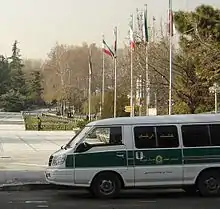Guidance Patrol
Guidance Patrol (Persian: گشت ارشاد, gašt-e eršād), also known as Fashion police[1] or Morality police,[2] is a kind of vice squad in the Law Enforcement Force of the Islamic Republic of Iran, established in 2005[3] with the task to arrest mostly women (but also some men)[4] who deem improperly dressed according to the dress code.
.jpg.webp)
Consistency
The patrols usually consist of a van with male crew accompanied by chador-clad females that stand at busy public places e.g. shopping centers, squares and subway stations to pry, intercept and detain bad-hijabs.[3][1] They are driven to a correctional facility or police station, lectured on how to dress and almost always released on the same day[1] after their fathers, husbands or brothers go to the station to get them released.[3]
In 2013's Iranian Mother's Day, the patrols rewarded flowers to women for wearing chador (the preferred hijab style).[1]
Controversy

A matter of controversy in Iran, some officials and authorities state that based on their interpretation of Iranian police as an Islamic religious police, the Guidance Patrols serve to fulfill the requisites enjoining what is right and forbidding what is wrong[5] and are demanded by the people.[6] Others oppose their existence on the grounds that the police should respect citizens' freedom and dignity,[4] and enforce the law, not sharia.[7] They have also been criticized for being un-Islamic,[6] most importantly because performing the requisites is haraam (forbidden) when it leads to sedition.[5] It is also argued that the notion is a mutual obligation (including remonstrating officials by the people as well) limited to one side.[5]
The guidance patrol has also harassed trans women for lack of gender conformity.[8] When an Iranian trans woman was beaten in April 2018, police refused to help her.[9]
On 27 December 2017, Brig. Gen. Hossein Rahimi, head of Greater Tehran police, said, “According to the commander of the NAJA - Law Enforcement Force of the Islamic Republic of Iran, those who do not observe Islamic values and have negligence in this area will no longer be taken to detention centers, a legal case will not be made for them and we will not send them to court; rather, education classes to reform their behavior will be offered.” [10]
References
- "Iran: Fashion police". Economist. 5 May 2013. Retrieved 12 August 2016.
- Who are Islamic 'morality police'?
- Erdbrink, Thomas (7 May 2014). "When Freedom Is the Right to Stay Under Wraps". The New York Times. Retrieved 12 August 2016.
- Sharafedin, Bozorgmehr (20 April 2016). "Rouhani clashes with Iranian police over undercover hijab agents". Reuters. Retrieved 12 August 2016.
- Adib, Muhammad Jawad (26 September 2013). "Iran's 'Guidance Patrols' Stir Controversy". Al-Monitor. Retrieved 12 August 2016.
- Faghihi, Rohollah (6 May 2016). "Morality police go undercover to keep Tehran under cover". Middle East Eye. Retrieved 12 August 2016.
- Karami, Arash (27 April 2015). "Rouhani: Police should not enforce Islam". Al-Monitor. Retrieved 12 August 2016.
- https://www.rferl.org/a/iran-transgender/28931543.html
- https://www.pinknews.co.uk/2018/05/21/irans-transgender-community-are-being-beaten-and-disowned-in-spite-of-legal-protections/
- "Al Monitor".